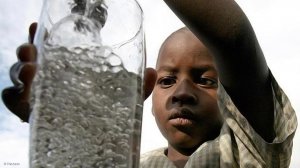September 23, 2014.
For Creamer Media in Johannesburg, I'm Natalie Greve.
Making headlines:
A series of unfortunate events have led to Johannesburg and surrounding areas experiencing significant water shortages.
A study reveals that Ebola could strike 20 000 in six weeks, and could 'rumble on for years'.
And, South Africa signs a nuclear power deal with Russia.
A series of unfortunate events led to Johannesburg and surrounding areas experiencing significant water shortages over the past week, City of Johannesburg mayoral committee member for development planning and urban management Roslynn Greeff said on Monday.
State-owned water utility Rand Water COO Sipho Mosai explained that the water shortages were caused by power outages, which coincided with the expected increase in water demand as the season changed from winter to spring.
Mosai said Rand Water had on September 15 experienced a power outage at its Eikenhof booster pumping station – which received its power from Johannesburg City Power. This resulted in Rand Water being unable to meet the increased seasonal demand in certain areas.
He avoided giving an indication of when full supply would be restored. This depended on the levels of the reservoirs, which were also impacted on by demand from people who did have access to water.
The Ebola outbreak in West Africa could infect 20 000 people as soon as early November unless rigorous infection control measures are implemented. Health researchers admitted, however, that the problem might "rumble on" for years in a holding pattern.
In an article in the New England Journal of Medicine, experts from the World Health Organisation and Imperial College said that infections will continue climbing exponentially unless patients are isolated, contacts traced and communities enlisted.
The WHO, in an initial roadmap issued on August 28, predicted that the virus could strike 20 000 people within the next nine months. The current death toll is at least 2 811 out of 5 864 cases, the UN agency says.
Meanwhile, the Democratic Republic of Congo’s outbreak, which is experiencing an unrelated epidemic to West Africa’s, is "almost over" with no new cases detected for several days. Senegal and Nigeria also reported that outbreaks there were now contained.
South Africa signed a nuclear power cooperation deal with Russia on Monday that paves the way for the building of up to 9.6 GW of nuclear power based on Russian technology by 2030.
The surprise announcement from the sidelines of a International Atomic Energy conference in Vienna suggests Pretoria is moving ahead with its plans for nuclear power, despite concerns over funding.
"This agreement opens up the door for South Africa to access Russian technologies, funding, infrastructure, and provides proper and solid platform for future extensive collaboration," South African Energy Minister Tina Joemat-Pettersson said in the statement.
Rosatom director-general Sergey Kirienko said the deal for up to eight nuclear power units could create thousands of jobs and create orders worth $10-billion to "local industrial enterprises”.
Also making headlines:
Deputy Labour Minister Patekile Holomisa says collusion within the construction industry undermines government's efforts towards social and economic transformation.
Cooperative Governance and Traditional Affairs Minister Pravin Gordhan revealed that municipalities owe water boards some R2-billion.
And, four senior generals have quit the mostly Muslim Seleka rebel group controlling northern Central African Republic, saying they disagreed with secessionist plans for its northern enclave.
That’s a roundup of news making headlines today.
EMAIL THIS ARTICLE SAVE THIS ARTICLE
To subscribe email subscriptions@creamermedia.co.za or click here
To advertise email advertising@creamermedia.co.za or click here










